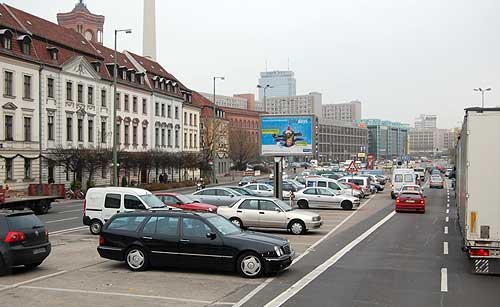|

Is
that really the solution: Germany only exports cars and
machines and imports all other consumer goods in
counter-products?
The
fairy tale of the international division of
labor
Many
important politicians swear by the international division of
labor. They think it would be great for a country to
specialize in certain commodities, then market them globally
and, in return, cheaply import other products.
The
idea of the international division of labor is old hat!
The
thesis of the international division of labor is anything
but new - it was already propagated in 1817 by David
Ricardo. He implored the producing nations to focus on their
country-specific strengths and to do most of what they do
best.
As a classic example, Ricardo called Portugal, which was
able to produce both wine and cloth cheaper than England.
His then recommendation: Portugal should only produce wine,
because there the cost advantage was particularly high and
then import cloth in exchange for wine from
England.
Theoretically,
Portugal and England would indeed benefit from this deal
(higher productivity). However, the dangers of monoculture
(mutual interdependence), transport costs, etc., are largely
ignored in this maids' bill. What happens in the event of a
crop failure? What are the consequences of market changes
(if other countries suddenly offer the same goods
cheaper)?
And anyway: How should the necessary balance of the exchange
of goods arise - should you force the English to expensive
wine consumption, even if they would rather drink
beer?
"International
Division of Labor":
What's
up with this idea, does it really bring a comparative
advantage?
To
clarify this important question, one should quietly learn
lessons from history and look at the development of West
Germany after 1949. The 60-year period until 2009 is divided
in an ideal way into two independent blocks of equal
size.
At the end of the 1970s, a change of system took
place worldwide (unquestioned and unnoticed by the public):
The protection of the domestic economy was abandoned by
the massive reduction of tariffs, thus ushering in the
age of global dumping competition (much the same as
globalization) Ricardo had propagated it in
1817).
What
was the result? Although the economy and productivity
continued to grow after 1980 (albeit at a much slower rate),
strangely enough, nothing came up behind them (even the
modest growth rates did not materialize).
Real wages fell by almost 20 percent in the three
decades after 1980, while they had increased by about 300
percent in the 30-year period before (1950-1979).
Details
...
"International
Division of Labor":
The
descent is denied and hushed up ...
Now
the capitalized globalization lobby is not tired of twisting
these exposing facts and tries to cover up the clear debacle
with many dodges.
One eloquently speaks of a market
saturation
that set in in 1980, apologizes for the increasing
aging of society and the high costs of German
reunification.
But
such excuses are not very valid. As long as new products
are invented and in demand, there is no market
saturation!
As far as demographic trends are concerned, it has been
going on for over 100 years without ever having raised any
issues.
And the costs of German reunification? The removal of the
debris landscape after the Second World War was much more
difficult than the reconstruction of East after 1990 and has
not prevented the rapid rise in prosperity.
What
must be taken into account, however: In the 1980s, a
revolutionary computer and microchip technology began, which
triggered an extraordinary boost in productivity and its
importance is approximately equivalent to the revolutionary
inventions at the beginning of industrialization. The
computer age should have brought the high-wage countries
actually a particularly high increase in
prosperity.
|

Which
consumer goods (except food) are still produced in
Germany?
And even with the few exceptions (automotive
industry, mechanical engineering, chemicals): How
high is the level of vertical integration when the
value added comes largely from foreign
suppliers?
|
|
"International
Division of Labor":
Many
politicians still cling to the master race
ideology
What should one think of it when politicians unwaveringly
regard Germany as a think tank and China as a workbench?
What arrogance is behind this detached thinking! As if the
Chinese were less intelligent or less powerful than the
Germans.
In
the long term, product development will always be located
where production takes place. So this value creation process
will increasingly migrate to the Far East, especially since
research is much cheaper there (China trains ten times more
engineers annually than Germany).
The export of German industrial products is becoming
increasingly difficult and manufacturing verticals continue
to decline - this trend will not be concealed in the long
term, despite all accounting cosmetics.
200
years ago, global competition was still very different
...
To honor the salvation of Ricardo it should be admitted that
at that time the grave wage differences did not exist
(world-wide factory workers only received starvation
wages).
With the stark wage differences of more than 1000 percent,
as we unfortunately find today, Ricardo would certainly
never have propagated an international division of labor
and, on the contrary, regarded import duties as a basic
condition for the preservation of one's own economic
power.
The
capital and globalization lobby, however, does not want to
know about the changed circumstances, it continues to refer
to Ricardo's ancient theses - knowing that she benefits most
from them.
Continue
reading: The
international division of labor is
counterproductive!
In addition: How
does economic growth come about?
Excuse
me!
There is no equal opportunity - also with regard to the
formation of opinions. While the capital (corporations,
speculators, lobbyists, media, governments) can afford the
best translators, I have to settle for financial reasons
with a simple language program. I hope that the text is
nevertheless reasonably understandable and that no mistakes
have occurred. Thank you for your
understanding.
Manfred
Julius Müller, D-24939 Flensburg (Flensburg has about
90,000 inhabitants and is located on the German-Danish
border).
Background
and analysis:
In
Germany wages have been falling since 1980.
Why?
Germany:
The brazen proclamation of skills
shortage!
Globalization:
the ignorance of the facts
The
political and economic consequences of an
brexit
An
analytical consideration from German
view.
"We
have to explain Europe
better!"
When
will the Dexit? (the withdrawal of Germany from the
EU)
The
capitalist Powers Act
Globalization:
"One cannot produce that with us
anymore!"
The
fairy tale of the international division of
labor
The
international division of labor is
counterproductive!
The
fear of British Farmers before the
Brexit!
The
impact of globalization on developing
countries
Brainwashing:
"We want an open Europe!"
How
much democracy can withstand the EU?
Ist
die Globalisierung Basis unseres
Wohlstandes?
Und leben wir auf Kosten der
anderen?
(Eingangsseite
www.anti-globalisierung.de)
Impressum
©
Manfred Julius Müller, Flensburg, Februar 2011,
Nachtrag 2017
Current
books by Manfred Julius Müller (unfortunately currently
only available in German):
CAPITAL
AND GLOBALIZATION
- only Euro 13.50
THE
CAPITAL and the world economic
crises
- only Euro 5.80
THE
CAPITAL and the welfare
state
- only Euro 7.90
OUT
OF THE EU or persevere until the
sinking?
- only Euro 5,90
The
free trade delusion
- only Euro 6.50
Humanity
knows no boundaries. Stupidity, but not
too!
- only Euro 6.80
Only
Fairtrade! The capitalist Reformation! 35 theses for a
fairer world!
- only 5,- Euro
Manfred
Julius Müller
has analyzed global economic processes for more than 30
years. He is the author of various books on the topics of
globalization, capitalism and politics. Some texts by
Manfred Julius Müller also found their way into
textbooks or are used for teacher training.
The
analyzes and texts by Manfred Julius Müller are
non-partisan and
independent!
They
are not, as is often the case, sponsored by state
institutions, global players, corporations, associations,
political parties, trade unions, the EU or capital
lobby!
|

